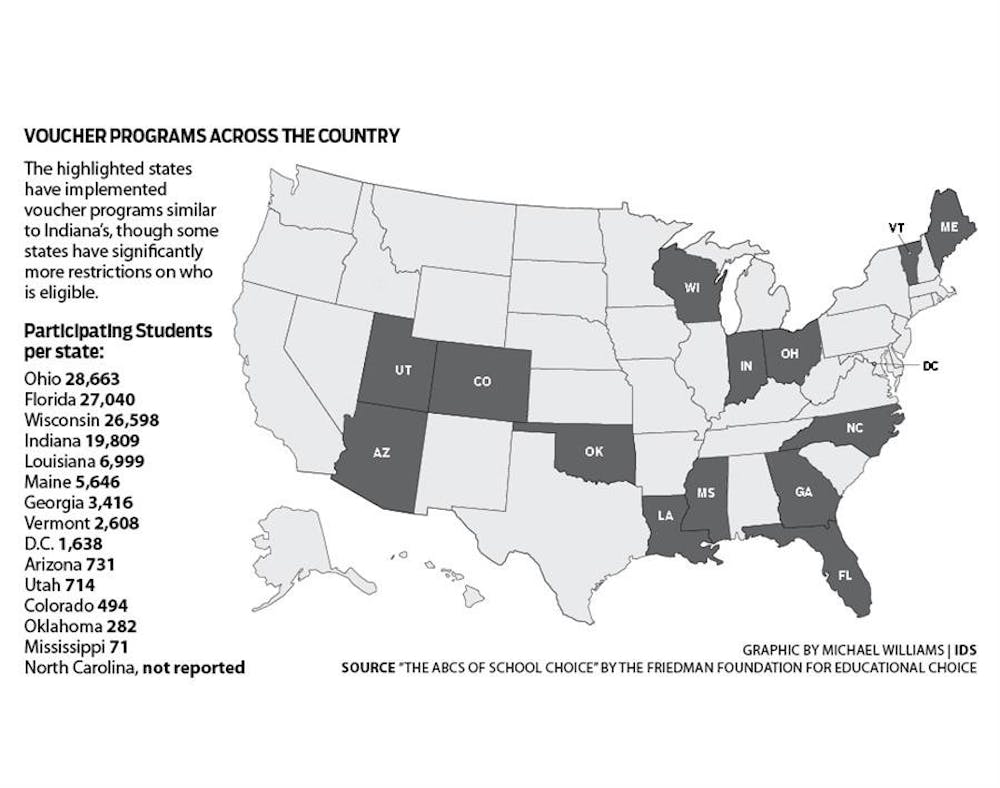Echoing strong legislative efforts during the 1980s to institute creationism in American schools, state money still indirectly funds controversial curriculum in the form of vouchers.
Many Americans have resisted teachings about evolution, leading to a relatively low global ranking on public acceptance of the theory, according to a 2006 survey published in the national journal “Science.”
A debate Tuesday night between evolutionist Bill Nye and creationist Ken Ham shed light on the issue of whether creationism can be considered a viable scientific theory.
One such school that receives vouchers from the state of Indiana, Lighthouse Christian Academy, is located in Bloomington on West That Road.
Lighthouse is a private school that participates in School Choice Indiana’s Choice Scholarship Program.
School Choice Indiana is designed to help families wishing to educate their children in alternative schools through state voucher funding if the student meets several eligibility requirements.
“We are accredited by the state of Indiana. It’s called freeway status, which is actually designed for small public schools but also used for non-public schools,” said Don Wilson, president of Lighthouse Christian Academy. “As part of that accreditation, we do have to meet the same curriculum standards as any other school in the state of Indiana.”
The Freeway School Program is an alternative to regular accreditation, allowing for a contract with the State Board of Education, according to the Indiana Non-Public Education Association website.
Wilson said Lighthouse does not take an official position on any specific theory of creationism or affiliate itself with any church. Rather, the school’s position is “God is creator.”
There are several different forms of creationism, IU biology professor Rudolf Raff said.
These theories include theistic evolution, the belief in both evolution and God; young earth creationism, a belief in a literal interpretation of the biblical book Genesis; and intelligent design creationism, the belief that God created the earth and then allowed for evolutionary processes to occur.
“Our students understand evolution very well,” Wilson said. “They also have a real understanding of creationism.”
When studying the book of Genesis, for example, the students will examine both literal and non-literal interpretations, he said.
The Indiana General Assembly passed legislation instituting the state voucher program in 2011, said Betsy Wiley, president of School Choice Indiana.
Two years later, the Indiana Supreme Court ruled the program was constitutional.
When a state authorizes a voucher program allowing for religious schools to be eligible for participation, the program is subject to constitutional questioning, according to the Georgetown Law Journal.
“The U.S. Supreme Court has not definitively ruled on the constitutionality on voucher programs, although it was presented with and declined that opportunity in the October 1998 term,” according to the journal.
Wiley said the voucher goes to the family, and then the family makes the decision as to which school they will attend.
“It doesn’t go from the state to the school,” she said.
The parents can choose to use all or part of the government funding to send their children to a public or private school of their choice, granted the school is participating in the voucher program.
Creationists introduced equal time legislation in 19 states between 1980 and 1985, according to the San Diego Law Review.
“One of those states was Louisiana, in which the 1981 Balanced Treatment for Creation-Science and Evolution in Public School Instruction Act gave rise to Edwards v. Aguillard,” according to the review.
The act prevented the teaching of evolution in public schools unless equal classroom time was given to creationism.
In 1987 the U.S. Supreme Court decided the act violated the establishment clause of the First Amendment, the separation of church and state, because it lacked a clear secular purpose, according to the Edwards v. Aguillard Court opinion.
“It’s a philosophical issue and an issue of origins rather than of science,” Wilson said. “But there’s also looking at the scientific evidence for creationism and looking at the weaknesses in evolutionary theory.”
The Court argued the act’s purpose was to restructure the science curriculum to conform to a particular religious position.
“There is no debate,” Raff said. “The scientific facts are clear. They come from physics, biology, chemistry, paleontology, geology, you name it. We know the science, and there’s no room for that kind of creationist material that’s generally taught in these schools.”
Science is a purely physical approach to the nature of the world and leaves off the philosophical or religious notions, looking instead at what the evidence says, Raff said.
“The evidence comes from the natural world, not from some other kind of source,” he said. “And I think people have a hard time distinguishing between what you learn from an examination of the natural world versus what you derive philosophically or religiously from a system of organizing your own sense of the
universe.”
State indirectly funds creationism

Get stories like this in your inbox
Subscribe



